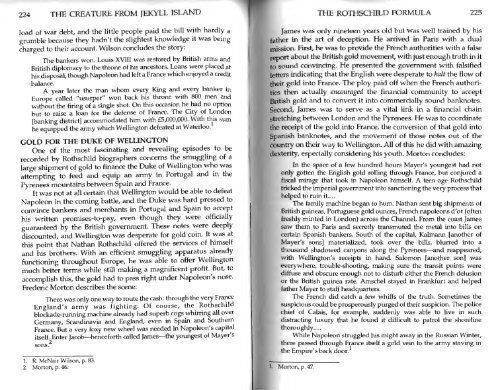You also want an ePaper? Increase the reach of your titles
YUMPU automatically turns print PDFs into web optimized ePapers that Google loves.
224 THE CREATURE FROM JEKYLL ISLAND<br />
THE ROTHSCHILD FORMULA 225<br />
load of war debt, and the little people paid the bill with hardly a<br />
grumble because they hadn't the slightest knowledge it was being<br />
charged to their account. Wilson concludes the story:<br />
The bankers won. Louis XVIII was restored by British arms and<br />
British diplomacy to the throne of his ancestors. Loans were placed at<br />
his disposal, though Napoleon had left a France which enjoyed a credit<br />
balance.<br />
A year later the man whom every King and every banker in<br />
Europe called "usurper" won back his throne with 800 men and<br />
without the firing of a single shot. On this occasion he had no option<br />
but to raise a loan for the defense of France. The City of London<br />
[banking district] accommodated him with £5,000,000. With this sum<br />
he equipped the army which Wellington defeated at Waterloo.<br />
GOLD FOR THE DUKE OF WELLINGTON<br />
One of the most fascinating and revealing episodes to be<br />
recorded by Rothschild biographers concerns the smuggling of a<br />
large shipment of gold to finance the Duke of Wellington who was<br />
attempting to feed and equip an army in Portugal and in the<br />
Pyrenees mountains between Spain and France.<br />
It was not at all certain that Wellington would be able to defeat<br />
Napoleon in the coming battle, and the Duke was hard pressed to<br />
convince bankers and merchants in Portugal and Spain to accept<br />
his written promises-to-pay, even though they were officially<br />
guaranteed by the British government These notes were deeply<br />
discounted, and Wellington was desperate for gold coin. It was at<br />
this point that Nathan Rothschild offered the services of himself<br />
and his brothers. With an efficient smuggling apparatus already<br />
functioning throughout Europe, he was able to offer Wellington<br />
much better terms while still making a magnificent profit. But, to<br />
accomplish this, the gold had to pass right under Napoleon's nose.<br />
Frederic Morton describes the scene:<br />
There was only one way to route the cash: through the very France<br />
England's army was fighting. Of course, the Rothschild<br />
blockade-running machine already had superb cogs whirring all over<br />
Germany, Scandinavia and England, even in Spain and Southern<br />
France. But a very foxy new wheel was needed in Napoleon's capital<br />
itself. Enter Jacob—henceforth called James—the youngest of Mayer's<br />
sons.<br />
1. R. McNair Wilson, p. 83.<br />
2. Morton, p. 46.<br />
James was only nineteen years old but was well trained by his<br />
father in the art of deception. He arrived in Paris with a dual<br />
mission. First, he was to provide the French authorities with a false<br />
report about the British gold movement, with just enough truth in it<br />
lo sound convincing. He presented the government with falsified<br />
letters indicating that the English were desperate to halt the flow of<br />
their gold into France. The ploy paid off when the French authorities<br />
then actually encouraged the financial community to accept<br />
British gold and to convert it into commercially sound banknotes.<br />
Second, James was to serve as a vital link in a financial chain<br />
stretching between London and the Pyrenees. He was to coordinate<br />
the receipt of the gold into France, the conversion of that gold into<br />
Spanish banknotes, and the movement of those notes out of the<br />
country on their way to Wellington. All of this he did with amazing<br />
dexterity, especially considering his youth. Morton concludes:<br />
In the space of a few hundred hours Mayer's youngest had not<br />
only gotten the English gold rolling through France, but conjured a<br />
fiscal mirage that took in Napoleon himself. A teen-age Rothschild<br />
tricked the imperial government into sanctioning the very process that<br />
helped to ruin it...<br />
The family machine began to hum. Nathan sent big shipments of<br />
British guineas, Portuguese gold ounces, French napoleons d'or (often<br />
freshly minted in London) across the Channel. From the coast James<br />
saw them to Paris and secretly transmuted the metal into bills on<br />
certain Spanish bankers. South of the capital, Kalmann [another of<br />
Mayer's sons] materialized, took over the bills, blurred into a<br />
thousand shadowed canyons along the Pyrenees—and reappeared,<br />
with Wellington's receipts in hand. Salomon [another son] was<br />
everywhere, trouble-shooting, making sure the transit points were<br />
diffuse and obscure enough not to disturb either the French delusion<br />
or the British guinea rate. Amschel stayed in Frankfurt and helped<br />
father Mayer to staff headquarters.<br />
The French did catch a few whiffs of the<br />
truth. Sometimes the<br />
suspicious could be prosperously purged of their suspicion. The police<br />
chief of Calais, for example, suddenly was able to live in such<br />
distracting luxury that he found it difficult to patrol the shoreline<br />
thoroughly....<br />
While Napoleon struggled his might away in the Russian Winter,<br />
there passed through France itself a gold vein to the army staving in<br />
the Empire's back door.<br />
I Morton, p. 47.


